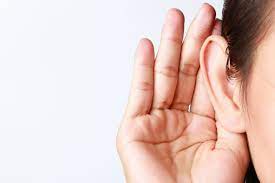
Though countless things can be said about the benefits of talk therapy, listening has its own special benefits, and it may do more good for you than you’d think.
Taking the time to listen to someone else, whether they are talking about their day, a book they just read, a movie they watched, or even their own mental health issues- can do a lot of good. Not just for our own mental health, but for the health of others as well. The problem is, most of us, aren’t as great at listening, as we could be.
An extensive study at the University of Minnesota, examined the listening ability of several thousand students and of hundreds of business and professional people. In each case, the participants listened to short talks by faculty members and were examined to see how well they grasped the content. The tests results led to this conclusion: Immediately after the average person has listened to someone talk, they remember only about half of what they have heard—no matter how carefully they thought they were listening. The solution- making an effort to practice something known as active and effective listening.
Active Listening is defined as making a conscious effort to hear not only the words that another person is saying but, more importantly, the complete message being communicated. In order to do this, you must pay attention to the other person very carefully. While effective listening is defined as actively absorbing the information given to you by a speaker, showing that you are listening and interested, and providing feedback to the speaker so that he or she knows the message was received. Effective listeners show speakers that they have been heard and understood.
In both practices, it is critically important to refrain from becoming distracted by whatever else may be going on around you, or by forming what you plan to say, while the other person is still speaking. The practices involve focusing on the other person, rather than yourself. And the benefits of doing this are many.
Being both an effective and active listener helps in the development of empathy. This allows us to better understand what someone else is going through in a much better way than a normal listener, as it involves providing appropriate responses, feeling the gravity of the situation, and can even lead to the suggestion of optimal solutions.
With practice, the listener can also become better at understanding emotions and also at processing them. This not only helps the speaker, but it also helps the listener in processing their own emotions. And even more, it leads to the development of a better connection to others and can ease any tension, stress, anxiety, or awkwardness that one might feel while engaging in conversation.
The improved social connections that come from being a good listener, have a positive impact on physical health, as well as mental and emotional well-being. Studies have found again and again that people who feel more connected to others have lower levels of anxiety and depression.
Moreover, researchers have also found that good listeners have higher self-esteem, greater empathy for others, are more trusting and cooperative and, as a result, others are more open to trusting and cooperating with them. Therefore, the social connectedness that comes from listening generates an overall improvement of social, emotional, and physical well-being.
Furthermore, several studies over the past decade have found that many aspects of wellbeing are higher in those who volunteer their attention on listening to others, compared with those who do not. For example, one study from 2018 noted that:
Research has found that participation in voluntary services ( such as active and effective listening) is significantly predictive of better mental and physical health, life satisfaction, self-esteem, happiness, lower depressive symptoms, psychological distress, and mortality and functional inability. In fact, research into the brain has shown that giving and co-operating with others can stimulate the reward areas in the brain, helping to create positive feelings, and leads to a sense of purpose and feelings of self-worth.
So next time someone wants to talk to you, make a better effort to tune out the rest of the world, as well as your own thoughts and experiences, and just listen. If you relate to the person talking, you will have your turn to share, but in order to be effective, it’s important to be present and focus on the other person first. Giving our attention to others in this constructive way helps us to strengthen our relationships and build new ones, and of course, healthy relationships with others also influence mental wellbeing.
For more information on the mental health benefits of being a good listener, check out the following link: https://www.mentalhealthfirstaid.org/2017/07/quiet-power-listening/